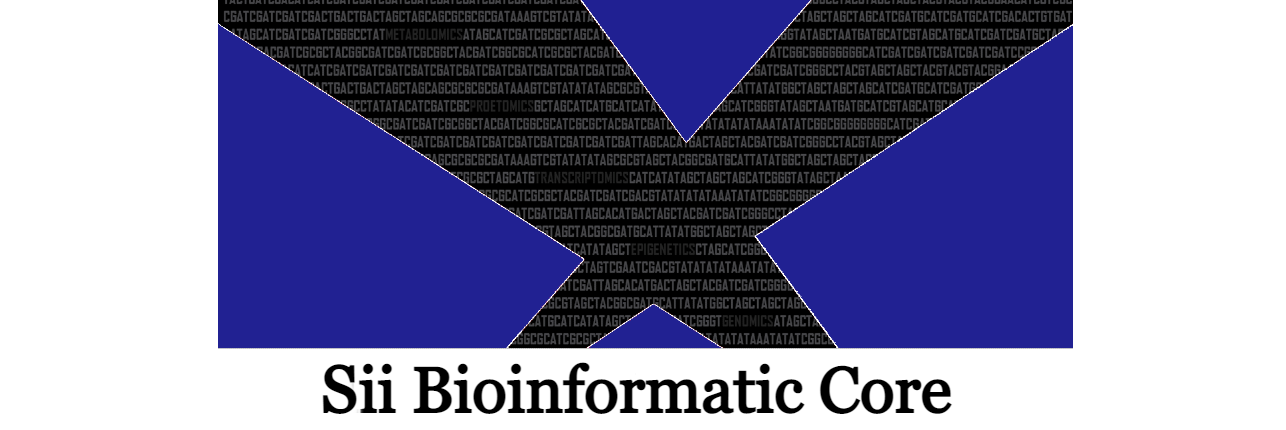
Our services are available to all members of Sii, and we can assist with any bioinformatic project regardless of duration, biology or omic technology. We have expertise in transcriptomics, proteomics, metabolomics, epigenomics and genomics, and a wide range of organisms. We accept projects at any stage and can support you from conception through to manuscript figures and writeup. We operate as a pay-for-use service; however, our fees are subsidised and very modest.
Our list of services includes:
- Omic data analysis, visualisation and communication
- Assistance with writing grant applications - methods, costing, etc.
- Training for staff and PhD students
- General advice and support drop-in sessions.
If you have any questions or wish to discuss a current or future omic project, please contact John.Cole@glasgow.ac.uk for an informal chat.
Omic Data Analysis & Visualisation
We provide omic data analysis at a subsidised rate of £750 per full time week. All income that we bring in is invested back into the School. Please see the below table for a guide to the typical time and costs, associated with the analysis of common omic data types. If you have data that needs processed or explored or are planning an experiment, please contact us for an informal chat.
|
Four Years Data Storage |
Omic Data Analysis |
Produce Manuscript Figures & Text (if required) |
|
|
Bulk RNA-seq |
£250 |
2 weeks (£1,500) |
2 weeks (£1,500) |
|
Proteomics |
£100 |
2 weeks (£1,500) |
2 weeks (£1,500) |
|
Metabolomics |
£100 |
2 weeks (£1,500) |
2 weeks (£1,500) |
|
ChIP-seq |
£250 |
4 weeks (£3,000) |
3 weeks (£2,250) |
|
Genomics |
£250 |
4 weeks (£3,000) |
3 weeks (£2,250) |
|
ss RNA-seq |
£1,000 |
8 weeks (£6,000) |
6 weeks (£4,500) |
*These estimates based on typical datasets. Actual costs may vary.
Support for Grant Applications
If you are writing a grant proposal and would like some assistance or advice with details of experimental design, or methods or costing of an omic experiment, we are happy to help. Obviously, this is a completely free service. If necessary, we are happy for the service or its members to be directly named on grants. If you need support, please contact us.
Training for PhD Students and Staff
We provide subsidised bioinformatic training courses for PhD students and staff. These are 100 per cent 'entry level' and aimed at wet-lab biologists with no previous experience of bioinformatics or coding. All courses are part time, running Monday to Friday, 9.30am to 1.00pm, allowing for wet-lab work in the afternoon. They are provided live via zoom and are designed to equip attendees with all the skills required to perform their own bioinformatic analysis of any dataset. Courses are spaced out across the year and are repeated. Please see the below table for a summary by intended omic experiment type. For further details please contact John.Cole@glasgow.ac.uk. To register, please fill out this form.
|
|
Essential |
Essential Plus Recommended |
Blocks (essential in bold) |
|
RNA-seq |
4 weeks (£400) |
5 weeks (£500) |
A, B, C |
|
Proteomics |
2 weeks (£250) |
3 weeks (£350) |
A, B |
|
Metabolomics |
2 weeks (£250) |
3 weeks (£350) |
A, B |
|
ChIP-seq |
4 weeks (£400) |
5 weeks (£500) |
A, B, C |
|
Genomics |
4 weeks (£400) |
4 weeks (£400) |
A, C |
|
ss RNA-seq |
5 weeks (£500) |
6 weeks (£600) |
A, B, C, D |
(A) Omic Analysis and Plots Using R, (B) Complex Experiments, (C) Command Line Omics, (D) ssRNA-seq.
Advice Drop-in Sessions
As a no-cost service, we provide two bioinformatic advice drop-in sessions. These are weekly and held via Zoom. Anyone at all in the School can come along with no prior notice, and ask us any question whatsoever about bioinformatics, coding or omics. Don’t spend hours speculating - come and ask an expert. We are friendly.
The sessions are:
Tuesday | 1-2pm
Thursday | 1-2pm
Zoom Meeting ID: 980 5092 3481.
Contact
For all enquiries or questions, please contact John.Cole@glasgow.ac.uk or attend one of the weekly advice drop-in sessions (see above).



